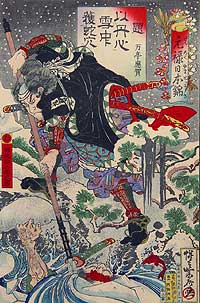 Horibe Yasubei Taketsune (1670-1702) was historically one of "the brave forty-seven ronin" who set out to avenge Lord Asano against the awful person of Kira whose greed & selfishness set in motion tragic events including the rage of their lord resulting in his having to commit seppuku, while the instigator went unpunished.
Horibe Yasubei Taketsune (1670-1702) was historically one of "the brave forty-seven ronin" who set out to avenge Lord Asano against the awful person of Kira whose greed & selfishness set in motion tragic events including the rage of their lord resulting in his having to commit seppuku, while the instigator went unpunished.
The tale of Asano's vassals' plot to avenge their lord, afterward committing seppuku en masse, has become the single most famous tale of duty, honor, & revenge in Japan, perhaps in the world.
The ukiyo-e block print shown here is of Yasubei on the night of the famous revenge. The design is by Kyosai Kawanabe (1831-1889) & was published in 1886.
Yasubei came to fame as Yasubei Nakayama before this tragedy, while still a masterless samurai, when in 1694 he killed three opponents at Takada-no-baba. Due to his heroic strength & skill, he attracted the attention of an aged retainer of the Asano Clan, Hiribei Yahei, who hired him as a clan retainer. He married Yahei's daughter & took their family name, becoming Horibe Yasubei thereafter.
Because of his prominant position in events that would unfold beginning in 1701 when Lord Asano drew his sword inside Edo Castle to assault the vile, insulting Kira Yoshinaka, Yasubei plays a prominent part in all retellings of that historical tale.
Many accounts of the individual members have arrisen on the periphery of the historical event, & Yasubei has been singled out more than any to have his life's story separately told as historical fiction. A television drama Horibe Yasubei was the New Years special for 2007, with Yukiyoshi Ozawa in the title role.
The television special was based on a novel by Shotaro Ikenami. It is a prequel to the classic samurai film Samurai Vendetta (Hakuoki, Daiei, 1958) because it outlines Yasubei's childhood & youth up to the time of Yasubei's famous duel at Takada-no-baba.
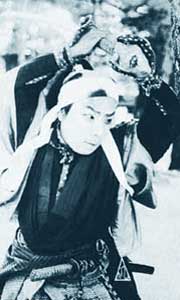 Yasubei was being lionized in silent films beginning no later than 1910, when the biggest film star of the 'teens & early twenties, Matsunosuke Onoe, played the title role in the short film Horibe Yasubei (1910).
Yasubei was being lionized in silent films beginning no later than 1910, when the biggest film star of the 'teens & early twenties, Matsunosuke Onoe, played the title role in the short film Horibe Yasubei (1910).
Onoe starred in remakes at least three times (Nikkatsu, 1913; Nikkatsu, 1918; Nikkatsu, 1921, at lengths varying up to seven reels) each time with the same star & director. The 1921 version was retitled Nakayama Yasubei.
None of these Onoe films survive, but contemporary catalog discriptions remain, as well as stills, & reproduced here is Onoe in the 1910 version of Horibe Yasubei. The performance was kabuki style, to be accompanied by a benshi or live narrator.
A couple other early films that are apparently lost to us include Shiro Nakagawa's Horibe Yasubei (1924) which starred Rotoku Arashi & Tamae Tsumori; & Jiro Yoshino's Horibe Yasubei (1924) starring Shirogoro Sawamura, & other versions including one from Tenkatsu Studios in 1915.
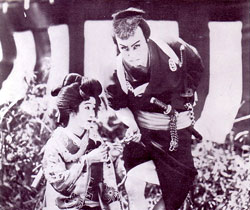 A scant six minutes survives of Daisuke Ito's Chikemuri takadanobaba (Blood-spattered at Takadanobaba, Nikkatsu Uzumasa, 1928). A scant six minutes survives of Daisuke Ito's Chikemuri takadanobaba (Blood-spattered at Takadanobaba, Nikkatsu Uzumasa, 1928).
This fragment shows the famous duel at Takada-no-baba which first thrust Yasubei in the public eye, before he became a retainer among Lord Asano's vassals. Denjiro Okochi plays the furioiusly fighting Yasubei.
Denjiro really was a fine cinematic swordsman, & in concert with a director like Ito who was concerned for realism, we get a realistic duel that is the direct opposite of Onoe's kabukiesque fighting style.
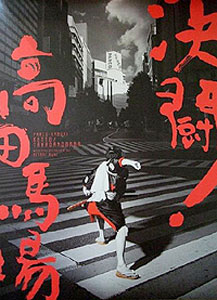 Though six minutes isn't much to have survived, it is important to note that the director in his old age wrote a new script about Yasubei that remains the standard story. Though six minutes isn't much to have survived, it is important to note that the director in his old age wrote a new script about Yasubei that remains the standard story.
Plus importantly there was the remake of Ito's largely lost original, refilmed as Chikemuri Takadanobaba, later recut & reissued as, Ketto Takadanobaba (Takadanobaba Duel; or, Duel at Takada-no-baba, Nikkatsu, 1937).
It is the latter cut being the one that happily survives at just under an hour length. Directed by Masahiro Makino with close assistance from Hiroshi Inagaki, Ketto Takadanobaba stars the great Tomisaburo Bando, "Bantsuma" to his fans of the late '20s & 1930s.
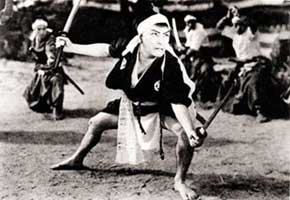 The first still for this segment of my overview is from Ito's largely lost silent. The second jpg is a modern poster for Bantsuma's surviving version, followed by two stills that convey perfectly Bantsuma's on-screen presence & the credible action choreography. The first still for this segment of my overview is from Ito's largely lost silent. The second jpg is a modern poster for Bantsuma's surviving version, followed by two stills that convey perfectly Bantsuma's on-screen presence & the credible action choreography.
Yasubei (Bantsuma) is portrayed as a ronin living amongst impoverished townsmen, the influence of the serial novel & 1928's first film version of Roningai; aka, Street of Masterless Samurai palpable.
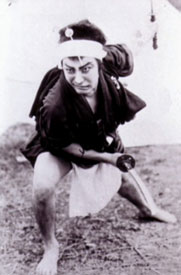 (As an aside, it can additionally be argued that the huge number of films about Tange Sazen, the one-eyed one-armed "monster" swordsman who dwells in the back lanes of Edo with the fallen & the disenfranchised, owes some of his nature to those same masterless men of Roningai). (As an aside, it can additionally be argued that the huge number of films about Tange Sazen, the one-eyed one-armed "monster" swordsman who dwells in the back lanes of Edo with the fallen & the disenfranchised, owes some of his nature to those same masterless men of Roningai).
Yasubei has come to love the vulgar masses he has fallen among. He's devil-may-care, often drunk, likes a good fight.
It's an amusing tale until the climax, when Yasubei, though in the midst of one of his binges, is called to his uncle's assistance in a fight.
The climactic battle sequence is one of the great one-against-all duels of all time, as Yasubei cuts down his uncle's murderous enemies one after another.
What every Japanese filmgoer would know, though it is unstated in the film, is that this "Nakayama" Yasubei later married the daughter of Horibe Yahei to become Horibei Hasubei, in consequence becoming one of the more prominant members of the Brave 47 Ronin.
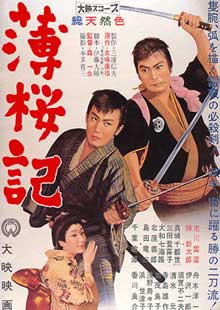 Kazuo Mori's Samurai Vendetta (Hakuoki, Daiei, 1959), from a script by the great chambara director & writer Daisuke Ito from an original story by Kosuke Gomi.
Kazuo Mori's Samurai Vendetta (Hakuoki, Daiei, 1959), from a script by the great chambara director & writer Daisuke Ito from an original story by Kosuke Gomi.
It stars Raizo Ichikawa as Tange Tenzen & Shintaro Katsu as Yasubei Nakayama, friends who will eventually end up on opposite sides of the plot to avenge Lord Asano against the despicable Kira of the famous tale of the brave 47 ronin.
This film shot Katsushin to serious stardom, Raizo already having been a major box-office draw. Katsu was second banana in well over a dozen of Raizo's films.
They were even originally cast as co-stars in the first Zatoichi movie, except that Katsushin, stinging from his secondary position in too many of his friend's films, interferred with the casting so that no one could upstage his very first blind swordsman performance.
In Samurai Vendetta, however, it was Katsu who did the upstaging, & he was on his way of a top-billed actor.
The tale opens with a duel between rival schools, for which Katsu as the ronin Yasubei is champion of the day. A certain witness to the battle was impressed, Yahei Horibei, elderly vassal of the Asano clan, who provided Yasubei with a sash to tie back his sleeves.
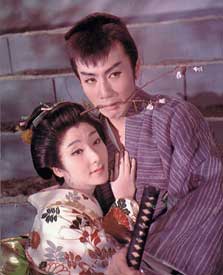 The definitive film covering the primary details of Yasubei's early career is Samurai Vendetta; also known as Chronicle of Pale Cherry Blossoms, which is a standard poetic reference to the 47 Ronin. The definitive film covering the primary details of Yasubei's early career is Samurai Vendetta; also known as Chronicle of Pale Cherry Blossoms, which is a standard poetic reference to the 47 Ronin.
Although the opening one-against-all duel is well done, I couldn't help but feel it would've looked better if Daisuke Ito had been in charge, describing his vision personally to the fight choreographer.
I felt similarly toward some of the later action scenes, excluding the climax which is one of the truly great desparate dueling sequences ever filmed, & surely reached the screen exactly as Daisuke Ito envisoned.
In the wake of the fight, Yasubei finds himself not rewarded for his victory. So as not to perpetuate emnity between the two schools, Yasubei is expelled. The rival school agreed likewise to expel their school's best swordsman.
Raizo Ichikawa's character Tange Tenzen is a member of the sword academy whose style was humiliated by Yasubei.
As he had witnessed the start of the duel, he is faulted by his sensei for permitting the Murakami brothers to be killed, & blamed that the reputation of the school must suffer.
He's made to feel it is his duty to restore that reputation, though in his heart he has no reason to fight Yasubei, & knows he is being scapegoated for an incident that did not involve him.
He therefore declines to accept any burden of vengeance against Yasubei, causing his fellow dojo members to despise him. He is thus the one selected to be expelled from Chushu Shinden school.
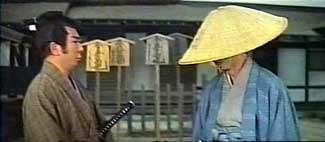 In this peaceful era when lords do not hire samurai for purposes of warfare, association with a leading school of swordsmanship was one of the higher achievements. For warriors who will never be called to actual battle, being expelled from a dojo is tantamount to court martial.
In this peaceful era when lords do not hire samurai for purposes of warfare, association with a leading school of swordsmanship was one of the higher achievements. For warriors who will never be called to actual battle, being expelled from a dojo is tantamount to court martial.
The top swordsmen of two distinguished academies could not expelled without it being news. Tenzen was already a minor official so had some standing of his own, & would just have to weather the gossip.
Yasubei however had only his school. Still, having shown himself to be his school's strongest exponent, he suddenly had a better chance than most masterless samurai of obtaining a position.
He was certain he'd be taken in by the Asano clan, due to having impressed Yahei. But the Uesugi clan has also been impressed by Yasubei. They are powerful friends of the notorious Kira, whose ill treatment of Lord Asano would shortly give rise to the "treasure house" of masterless samurai in the famous & perfectly historical tale of vengeance known as Chushingura.
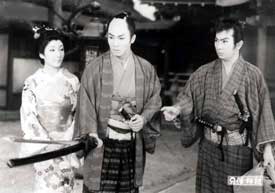 The 15th Shogun had a veritable fetish for dogs & anyone who harmed one would be tortured. Whoever killed a dog would be slain. A young woman attacked by a pack of feral dogs is saved by Tange Tenzen. Yasubei helped Tange avoid suspicion, having the ulterior motive of wanting to get to know that young woman, Chiharu (Chitose Maki), who'd been saved from the dogs.
The 15th Shogun had a veritable fetish for dogs & anyone who harmed one would be tortured. Whoever killed a dog would be slain. A young woman attacked by a pack of feral dogs is saved by Tange Tenzen. Yasubei helped Tange avoid suspicion, having the ulterior motive of wanting to get to know that young woman, Chiharu (Chitose Maki), who'd been saved from the dogs.
She's a woman of the Uesugi clan. For the first time in his life, Yasubei has a crush on someone. It is because of her he decided to allign himself with the Uesugi clan rather than the Asano.
When Yasubei's old school seeks revenge against him even without authorization, Tange Tenzen is beholden to Yasubei due to the matter of the feral dogs. He thus fights his own ex-fellow students in defense of Yasubei. And Yasubei sees that Tenzen may well be close to his match.
The young woman Chiharu, having long been pressed by her family to accept one of her suitors in marriage, finally agrees. Before Yasubei can make his interest known, she becomes engaged to Tange Tenzen.
Due to this unexpected disappointment, Yasubei after all declines vassalage to the Uesugi clan. He goes into the pouring rain to the bridge where Tange Tenzen intervened in a duel in his behalf, & shed tears until Yahei of Ako happened by with an umbrella.
Thus it was the destiny of potential friends to serve clans that in due time would come to severe blows.
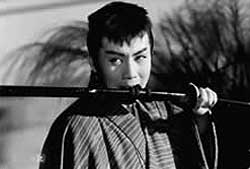 During the Girls Day Festival, when dolls are displayed, Chiharu becomes lonesome for Tange who has been sent to Kyoto.
During the Girls Day Festival, when dolls are displayed, Chiharu becomes lonesome for Tange who has been sent to Kyoto.
She falls into girlish play, pretending one of her dolls is Tenzen, & has a seductive loving one-sided conversation with her beloved.
She drinks a little sweet sake during this game & immediately falls ill, having been drugged by Omie, a bribed maid.
She's kidnapped by Tenzen's ex-dojo mates, who now hate him intensely. They cut dowmn Omie as they leave, clearly planning to ravage Tenzen's beloved.
They were the five men whom Tenzen wounded on the bridge, & Omie lived just long enough to describe them: Mita Shirogoro, who lost fingers in the duel; Iki Rentaro, who lost an eye; Miki Touemon, whose nose was cut off; Tonoe Mikinosuke, who lost part of his jaw; & Totani Hyogo of the crippled leg.
They make for a ragtag group of maimed enemies, bitter for their injuries, with an air of horror about them, a touch that only a screenwriter like Daisuke Ito would have cherished.
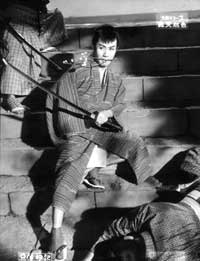 Yasubei Nakanama was renamed Yasubei Horibe when he joined the Asano clan. At first Tange Tenzen wonders why Yasubei was selected for rumor mongering, for to top off the mounting injustices, a false rumor is abroad, that when Tange Tenzen went to Kyoto, Chiharu consorted with Yasubei. Yasubei Nakanama was renamed Yasubei Horibe when he joined the Asano clan. At first Tange Tenzen wonders why Yasubei was selected for rumor mongering, for to top off the mounting injustices, a false rumor is abroad, that when Tange Tenzen went to Kyoto, Chiharu consorted with Yasubei.
Tange soon realizes it's because Yasubei is the other person those five men bitterly despise & against whom they seek vengeance in cowardly ways.
It is at this time, too, that Lord Asano is being maltreated by Kira, making Asano's role in important ceremonies miserably difficult to achieve, all for want of a larger bribe. Yahei & Yasubei struggle together to ease Lord Asano's difficulties.
Chiharu & Tange initially experienced a loving life together, but after her rape, their relationship became impaired. She begs Tange to kill her due to her dishonor. Though he is not attentive of her as before, he nevertheless wants to protect her. If no one knows she was violated, he tells her, there is no reason to die.
But Tenzen knows, & guilt-ridden as it makes him feel, he can no longer see her as the same woman. He pursues a divorce, after commanding that she live. He insists they are bound despite his own weakness, & assures her she has committed no sin or crime.
Their separation, however, seems to reinforce the rumor of her infidelity with Yasubei. Tenzen's plan to clear Chiharu's name within her family is touching & endearing, involving belief in fox legends. But still his duty & his sense of self is bound to samurai codes & strictures, & he returns her to her family divorced but free of suspicion.
Tange resigns his post & as a ronin plans to pursue the five men who brought this unhappiness upon him & Chiharu. Chiharu's brother, however, knowing nothing of what is truly going on, is incensed against Tange Tenzen's mistreatment of Chiharu, & cuts off Tenzen's right arm. What a moment!
As fate would have it, Tange Tenzen is soon taken in by the Uesagi clan to recover, on the same day that Asano attacked Kira in the Pine Court of Edo Palace. It will be distant winter before the Brave 47 Ronin, including Yasubei, march on the Uesugi mansion to kill Akira. Time enough for Tange Tenzen to heal.
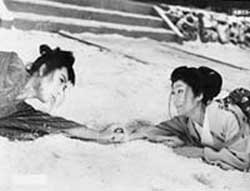 With Tange Tenzen now one-armed, the similarity of his name with that of Tange Sazen the one-eyed one-armed "lefty fence" is too close to ignore. With Tange Tenzen now one-armed, the similarity of his name with that of Tange Sazen the one-eyed one-armed "lefty fence" is too close to ignore.
It would seem that Daisuke Ito's initial intention was to tie together two distinct stories into one, though it was just too much of rewrite of Tange Sazen's biography.
Tange was hired to train Kira's bodyguards, some of whom were hired after the fall of the Asano clan & have never been anything but unruly ronin.
Five of these men, noted Lord Uesagi, were completely worthless & could be sacrificed during harsh training. These men, the very ones Tange Tenzen had previously maimed & who gang-raped his wife, were bait to insure Tange's assistance, a plan that would eventually go awry.
Yasubei & Chiharu's fateful path in all this provides additional plot-threads well worth the telling, Daisuke Ito's script being rich in little ironies.
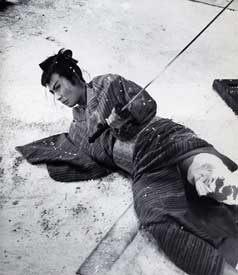 As a street performer, Tange Tenzen has turned himself into a novelty act, the undefeatable one-armed swordsman, taking any challengers from the audience.
As a street performer, Tange Tenzen has turned himself into a novelty act, the undefeatable one-armed swordsman, taking any challengers from the audience.
He knows that eventually the five men against whom he seeks vengeance will challenge him, giving him the opportunity he requires.
In their eventual encounter, Tange Tanzen gets shot by gimpy Tonoe Mikinosuke while killing noseless Miki Touemon & Mita "fingers" Shirogoro.
Chiharu nursed him in the emergency. Three of Tange's foes remained, intending to avenge themselves on him while he is in his sickbed, this being the best chance for cowards.
When their challenge comes, Tange, though one armed & shot in the leg, asks to be carried outside so he can fight them. They scoffingly agree to the "fair" duel, against not just the three, but several others they have rounded up.
This protracted action sequence will develop as one of the strongest & greatest one-against-all duels ever staged, comparable to Raizo's towering performance in Betrayal (Daisatsujin orochi, 1966) or Tatsuya Nakadai's in Sword of Doom (Daibosatsu toge, 1966).
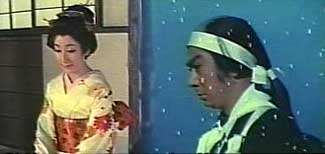 Tange's "unable to stand" & "apparently dead" ad hoc "style" is truly shocking & horrific. Tange's "unable to stand" & "apparently dead" ad hoc "style" is truly shocking & horrific.
All the choreographical genius missing from earlier duels is mustered for this insane duel in the snow.
Tange's so gigantically pitiful, but manages to hold his own against more than a dozen startled, doomed opponents.
Due to his injuries Tenzen never gets to defend Kira after all, but Yasubei would participate in the final assault on Uesugi mansion. The story closes on the final march of the Brave 47, having arrived at this famous moment through one of the greatest scripts in all chambara cinema. Production values very nearly live up to the author's genius, & the two main stars were born for these roles.
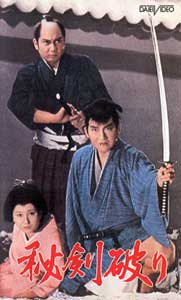 Broken Sword (Hiken yaburi, Daiei, 1969) is close remake of Samurai Vendetta from ten years before. A few colorful asides are dropped from Daisuke Ito's script. There are minor revisions in dialogue. The cast & cinematography & music for the soundtrack are better in the earlier version, though both versions are good.
Broken Sword (Hiken yaburi, Daiei, 1969) is close remake of Samurai Vendetta from ten years before. A few colorful asides are dropped from Daisuke Ito's script. There are minor revisions in dialogue. The cast & cinematography & music for the soundtrack are better in the earlier version, though both versions are good.
The camera set-ups are occasionally quite different so as not to be a slavish imitation, & in very few cases the handling of a scene is improved.
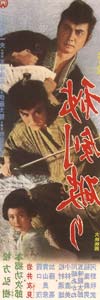 But mainly it is the same scene by scene. Yasubei's historical duel at Takada-no-baba opens both films, & only in this one is it clear that the emergency sash provided by Yahei Horibe was Yahei's young daughter's over-obi. But mainly it is the same scene by scene. Yasubei's historical duel at Takada-no-baba opens both films, & only in this one is it clear that the emergency sash provided by Yahei Horibe was Yahei's young daughter's over-obi.
Actors, however, can provide their own interpretations, & the attitude in this version tends to greater gloominess.
Chiharu (Tonomi Iwai), the young woman over whom Yasubei is heartbroken when she marries Tange Tenzen, is the one character played with greater depth than in the former version.
For the main male leads, however, Raizo Ichikawa & Shintaro Katsu from Samurai Vendetta are just so much more exciting than Broken Sword's Kojiro Hongo as Yasubei & Hiroki Matsukata as Tange Tenzen the distantant relation of Lord Kira.
By far the best scene in both versions is the climactic duel, Tange Tenzen alone against many in the snowy courtyard. He is by this time one-armed, shot in the leg, & unable to stand. He rolls & worms about in the snow clumsily, trashing pathetically but with heroic effect, as he kills so many of his foes.
The earlier version couldn't be outdone, but it could be nearly equalled. Very brutally staged & choreographed, that last duel goes on & on & on with pain & horror in every crippled stroke.
copyright © by Paghat the Ratgirl
|
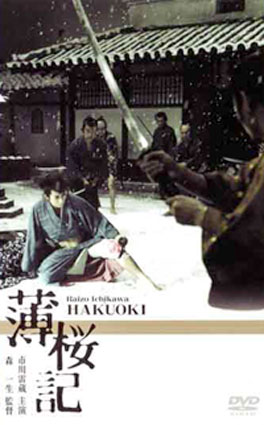



 Though six minutes isn't much to have survived, it is important to note that the director in his old age wrote a new script about Yasubei that remains the standard story.
Though six minutes isn't much to have survived, it is important to note that the director in his old age wrote a new script about Yasubei that remains the standard story. The first still for this segment of my overview is from Ito's largely lost silent. The second jpg is a modern poster for Bantsuma's surviving version, followed by two stills that convey perfectly Bantsuma's on-screen presence & the credible action choreography.
The first still for this segment of my overview is from Ito's largely lost silent. The second jpg is a modern poster for Bantsuma's surviving version, followed by two stills that convey perfectly Bantsuma's on-screen presence & the credible action choreography. (As an aside, it can additionally be argued that the huge number of films about
(As an aside, it can additionally be argued that the huge number of films about 





 With Tange Tenzen now one-armed, the similarity of his name with that of
With Tange Tenzen now one-armed, the similarity of his name with that of 
 Tange's "unable to stand" & "apparently dead" ad hoc "style" is truly shocking & horrific.
Tange's "unable to stand" & "apparently dead" ad hoc "style" is truly shocking & horrific.
 But mainly it is the same scene by scene. Yasubei's historical duel at Takada-no-baba opens both films, & only in this one is it clear that the emergency sash provided by Yahei Horibe was Yahei's young daughter's over-obi.
But mainly it is the same scene by scene. Yasubei's historical duel at Takada-no-baba opens both films, & only in this one is it clear that the emergency sash provided by Yahei Horibe was Yahei's young daughter's over-obi.